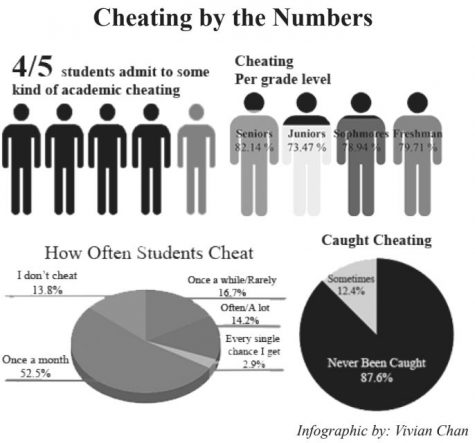Many Surveyed ERHS Students Say They Have Cheated
May 2, 2019
In a March 2019 survey* of 240 students, 80% of ERHS students said that they have cheated in school.
Students were asked questions on frequency of cheating, if they were ever caught, how they cheated, and why they cheated. Four out of five students admitted to having cheated before, and one in five students said they had never cheated.
Despite these high numbers, many other students said they still believed that cheating was wrong.
“If you think about it you are getting an unfair advantage over everybody else who worked hard.” stated junior Darryl Villard.
Students and teachers alike said they were not surprised with the survey results. Some even expected the number of cheaters to be much higher and said they understood where the cheaters were coming from.
Senior Sarah Wampler said that for some “It makes school easier and depending on the teacher, it’s really not that hard to get away with it.”
Villard echoed that students might cheat “… because they have a lot to worry about, like they have their personal life, and school on top of that…”
The survey backed these responses: “societal pressure,” “class difficulty,” and “pressure and stress from those around you” were the top three answers to the question asking why students cheat.
Many students shared that though pressure is high, cheating is still not worth it.
Freshman Chad Bo stated “I think the cons outweigh the pros.” Bo continued. “You don’t actually retain any information…And when you reach that situation where you can’t keep on cheating, you just fail and topple over.”
Sophomore Raina Dinksen shared similar sentiments. “You won’t learn anything. You won’t grow as a person if you cheat because if you cheat through life you cheat through your education.”
Teachers said that they were against cheating, but understood why some students might take that option.
“They find themselves overwhelmed and one way out of feeling overwhelmed is to cheat,” science teacher and department chair Ms. Rebecca Hammonds said. “Cheating is generally wrong. In the long run it doesn’t help the student learn. Later on in life the consequences are much greater than they are here … Don’t take the class if you don’t want to put the effort in.”
English and Capstone teacher Mr. Troy Bradbury explained that students here cheat “because there’s so much pressure on them to achieve something that they don’t know how to solve the problem. Because ultimately a lot of teachers here think their class is the most important class and they think that well if I give you 4 hours of homework a night, well I don’t care what happens in the other classes. And that’s all just garbage.”
He continued, explaining that the intentions behind cheating are important.
“I want to be able to help. If you’re cheating because you don’t understand. Well that’s my job to teach you.” Mr. Bradbury said. “Rarely do you find cheating to learn. That’s a different animal. Let’s say I cheated from my friend. If you’re good at math and I’m not good at math, and I’m cheating in order to help me learn more about math, is that really cheating?”
English and SPED teacher Ms. Beth Dunbar also addressed the responsibility for cheating. “I don’t feel like it’s just the kids fault. There are a lot of parents that put pressure on their kids and they’re also at fault. I don’t think they realize this.”
School Crisis Intervention Specialist Mr. Emmanuel Matey also put some of the responsibility on society and the media’s portrayal of cheating stating that “society makes kids feel that it is okay to cheat.”
And while the responses showed cheating to be a big problem at ERHS, Mr. Clinton Shands did not think this was only an issue at Roosevelt.
“It’s a national issue. Definitely not just Roosevelt or Prince George’s County” he said.
He continued, explaining that cheating leads to other issues. “The only thing you’re doing is cheating yourself in the end. It’s just not a practice that you want to have because if you continue, you’re going to be cheating your life and that’s definitely not something that you want to do,” Mr. Shands said.
*A random, anonymous survey with 240 Eleanor Roosevelt High School students was conducted during lunch periods to investigate cheating. The students surveyed included 84 seniors, 49 juniors, 38 sophomores, 69 freshman, 168 science and tech, 21 Capstone, and 51 boundary students. Of the surveyed ST students, 139 out of 168 said that they have cheated before. Of surveyed non-ST students (including Capstone and Business), 51 out of 72 said that they had cheated. The school has 2,639 students. 853 are science and technology students. To make this survey more representative, results would need to include more non-ST students to determine if the difference between 80% of ST and 70% non-ST students cheating remains consistent in a statistically relevant sample.




